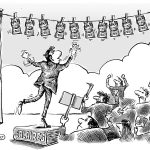It ain’t over yet…
An interview by Swiss journalist Yves Hulmann for allnews.ch, on May 12, 2020
For Valérie Plagnol, the action of central banks underpins the rebound in the markets. The lack of visibility remains on the extent of the recovery.
At a time of partial deconfinement in many European countries, what prospects can we foresee for the economy and the markets in the coming months? Interview with Valérie Plagnol, founding president of Vision & Perspectives Conseil en Investissements.
While many European countries are starting a gradual deconfinement process this week, there is still considerable uncertainty about the economic impact of the coronavirus pandemic, particularly its debt consequences. What do you think of the current discussion about debt pooling in the euro area?
The debate over the pooling of debts in the euro zone has attracted everyone’s attention. I find this a little regrettable when we do not, firstly, need it immediately. Since the 2011 crisis, Europe has forged a doctrine and acquired tools which have enabled member states and the Commission to intervene quickly and mobilize significant funds. And secondly, because this discussion often creates tensions between certain states rather than providing solutions. The Italians feel abandoned by Europe, while the Dutch believe that it is always up to them to get their hands on the wallet. Finally, thirdly, the legal basis of the “Eurobonds” or “Coronabonds” as they have been renamed for the occasion, has not yet been clarified. Recently, the Karlsruhe Constitutional Court had even declared that they were contrary to the German constitution. Debt pooling, taken in isolation, cannot be a solution to all problems.
Debt pooling cannot be a credible instrument if it is launched solo, without any other reform accompanying it.
However, is it not now, or in the coming months, that such an instrument might justly be necessary?
Whether it is the Greek debt crisis or other similar situations, the pooling of debts always comes up against the same problem which dates back to the origins of the construction of the Monetary Union. The Maastricht Treaty did not provide for debt solidarity between member states, and with the EU. Regarding debt pooling, I am not saying that we should never do it. Simply put, you can only issue Eurobonds if you also have a common European treasury. These two aspects are inseparable. You can only have a single debt if you also have a single Treasury and a Parliament to supervise it. This is the first basic principle.
The second is that there can only be a single debt if there is a common budget. This is why, the pooling of debts cannot be a credible instrument if it is launched solo, without any other reform that accompanies it. There can be a pooling of debts only if there is also a pooling of responsibilities, that is to say a transfer of budgetary sovereignty at European level.
Would it nevertheless be possible to launch specific post-Covid-19 loans which would aim to avoid that certain Member States should not borrow on more unfavorable conditions than others at the end of the crisis?
This is what the European Commission should be able to do. It is launching an ambitious aid program and will intervene within the framework of the structural and sectoral funds, to finance joint projects – we are thinking in particular of health. Today, thanks to the intervention of the European Central Bank, and under the umbrella of the euro, all member states are borrowing on particularly favorable terms. Even those whose debt levels are already very high.
Many countries are expected to experience a double-digit recession this year.
With regard to each national debt, the question of repaying the public debt still arises at this level. Why is it so important? Because the weight of public debt and the cost of its repayment crowds out other investment projects and weighs on the country’s activity through taxation and the capture of savings. There are a thousand ways to get out of debt. Which ones?
First, there is the possibility of reducing expenses. Second, to accelerate growth, which then facilitates repayments. Third, there is the capture of savings, which is also dubbed financial repression. Fourth, inflation is allowed to run, which makes it easier for states to repay their debts when they fall due. Finally, fifth, in the most unfavorable cases, there is default on debt. The combination of the first three means has served the most indebted states well after the end of the world war II.
Should we fear, in the long term, a possible return of inflation, especially in a scenario of “re-regionalization” of trade and sources of supply?
We hear a lot of discussions about phenomena of “re-regionalization” of world trade and supplies which would also be organized around shorter circuits. Given the degree of global integration of value chains, the characteristics of each sector, it is difficult to draw overly general conclusions. Complete dismantling of these circuits would imply an increase in production costs which, in turn, would lead to an increase in prices, then in wages, which would again contribute to raising prices. This would result in a supply shock. Should we believe it? In the short term, I am rather skeptical about such a scenario given the collapse of oil prices this spring and overall demand in decline. In the longer run, that is a possibility, if a relocation of some supply chain does not accompany a strong increase in productivity.



